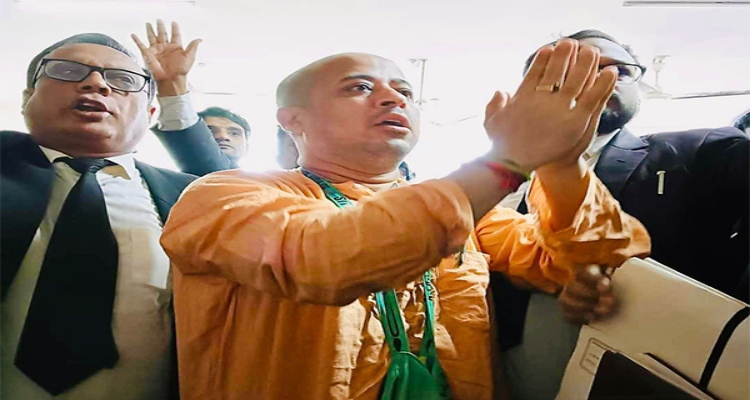
A court in Chattogram has rejected the bail plea of Chinmoy Krishna Das, a former ISKCON leader, during a hearing conducted under heightened security on January 2.
The decision was delivered by Chattogram Metropolitan Sessions Judge Md Saiful Islam after a 30-minute hearing, as confirmed by Metropolitan Public Prosecutor Advocate Mofizur Haque Bhuiyan.
Chinmoy Krishna Das faced sedition charges for allegedly hoisting a saffron flag above Bangladesh’s national flag in Chittagong on October 25. His arrest on November 25 triggered widespread unrest and violent protests.
During the hearing, 11 Supreme Court lawyers, under the banner of Ainjibi Oikya Parishad, argued for his bail. Lawyer Apurba Kumar Bhattacharjee, representing Chinmoy, told the media, “I have the Vakalatnama from Chinmoy. Being a member of both the Supreme Court and Chattogram Bar associations, I don’t need local authorisation to move the case.”
Case History
The case had earlier been delayed when the prosecution requested additional time during a December 3 hearing, citing the absence of legal representation for Chinmoy. The bail hearing was then rescheduled for January 2.
Tensions in Bangladesh escalated following Chinmoy’s arrest. Protests by his supporters outside the Chattogram Court Building on November 27 turned violent, resulting in clashes with law enforcement and the death of a lawyer. The unrest deepened after the subsequent arrests of two ISKCON monks, Adipurush Shyam Das and Ranganath Das Brahmachari, on November 29.
According to ISKCON Kolkata, the monks were detained after visiting Chinmoy in custody.
Additionally, ISKCON’s Vice President Radha Raman claimed that rioters vandalised an ISKCON centre in Bangladesh during the turmoil. The violence has drawn international attention, with India’s Ministry of External Affairs (MEA) expressing concern over the targeted attacks on minorities and extremist rhetoric in Bangladesh. The MEA stated it has consistently raised these issues with Dhaka.
Chinmoy Krishna Das’s bail rejection comes as unrest continues to ripple through the region, raising questions about the treatment of minorities and religious leaders in Bangladesh. The case remains a flashpoint, highlighting tensions over religious and national identity in the country.




